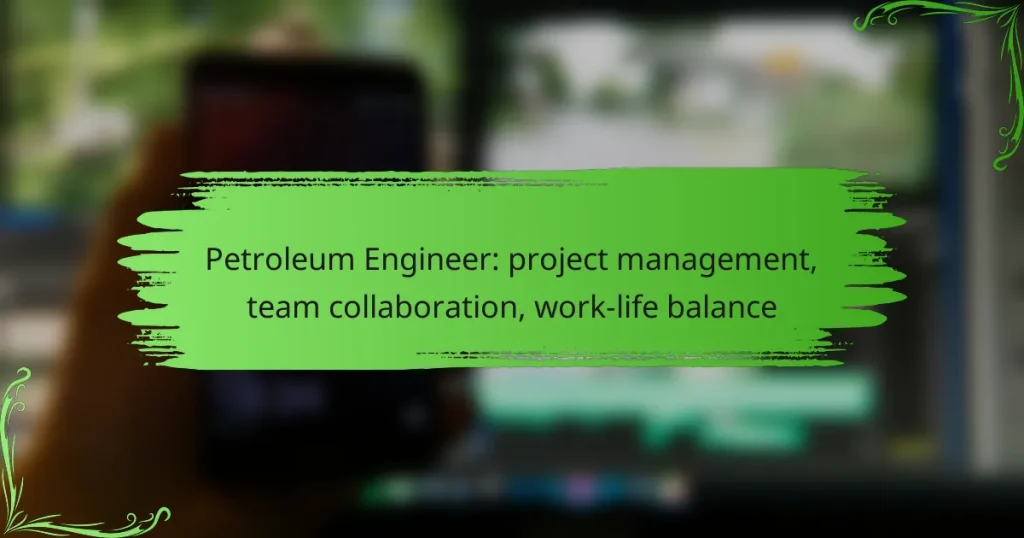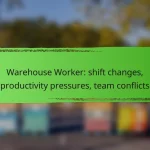Petroleum engineers play a crucial role in project management by utilizing structured methodologies and advanced technology to enhance collaboration and streamline processes. By embracing digital tools for communication and document sharing, they can improve team dynamics and productivity on complex projects. Additionally, achieving a healthy work-life balance is vital for maintaining job satisfaction and overall well-being in this demanding field.

How can petroleum engineers improve project management?
Petrroleum engineers can enhance project management by adopting structured methodologies, leveraging technology, and fostering collaboration. These strategies help streamline processes, mitigate risks, and optimize resource use, ultimately leading to more successful project outcomes.
Agile project management techniques
Agile project management techniques focus on flexibility and iterative progress, allowing petroleum engineers to adapt to changing project requirements. By breaking projects into smaller, manageable tasks, teams can respond quickly to challenges and stakeholder feedback.
Implementing regular check-ins and reviews can help maintain alignment and ensure that the project stays on track. Techniques such as daily stand-ups and sprint planning sessions encourage team collaboration and accountability.
Utilizing project management software like Asana
Project management software like Asana can significantly enhance communication and organization within petroleum engineering teams. These tools allow for task assignment, deadline tracking, and progress monitoring, which can improve overall project efficiency.
Using such software helps centralize project information, making it easily accessible to all team members. This transparency reduces misunderstandings and keeps everyone aligned on project goals and timelines.
Implementing risk management strategies
Effective risk management strategies are crucial for petroleum engineers to identify, assess, and mitigate potential project risks. Regularly conducting risk assessments can help teams anticipate challenges and develop contingency plans.
Utilizing tools like risk matrices can aid in prioritizing risks based on their likelihood and impact. This proactive approach allows engineers to allocate resources effectively and minimize disruptions during project execution.
Effective resource allocation methods
Effective resource allocation is essential for optimizing project outcomes in petroleum engineering. Engineers should evaluate resource availability and project needs to ensure that personnel, equipment, and materials are utilized efficiently.
Techniques such as resource leveling and critical path analysis can help identify bottlenecks and ensure that resources are allocated where they are most needed. Regularly reviewing resource usage can also help in making adjustments to improve project performance.
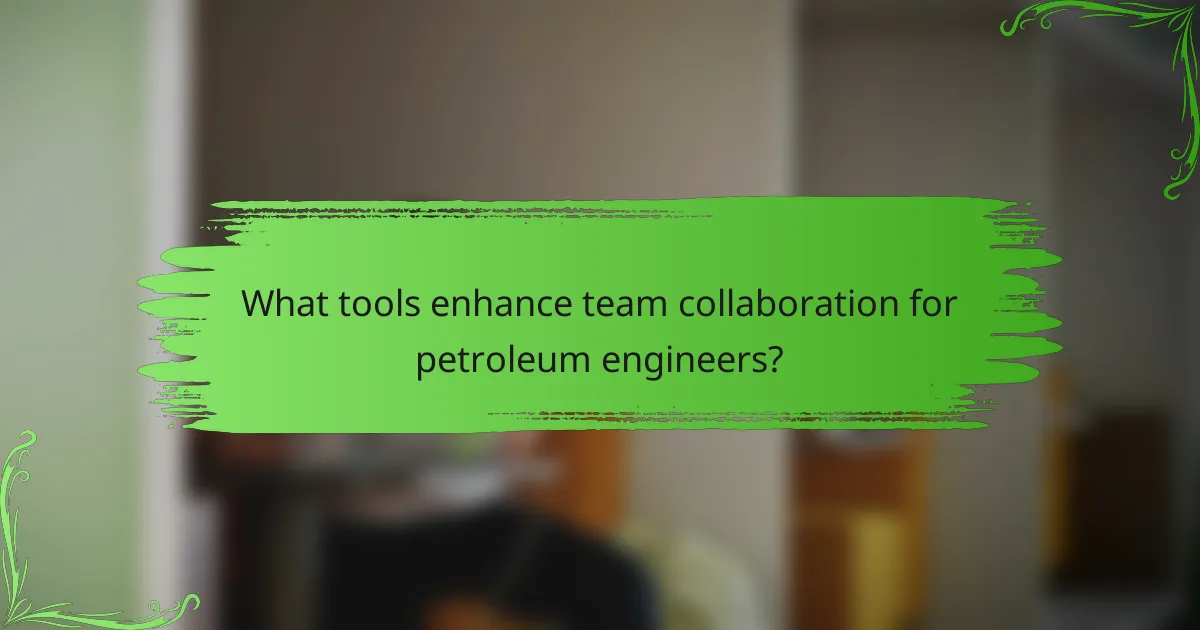
What tools enhance team collaboration for petroleum engineers?
Petroleum engineers can significantly improve team collaboration using various digital tools designed for communication, document sharing, and real-time interaction. These tools streamline workflows and enhance productivity, allowing teams to work more effectively on complex projects.
Collaboration platforms like Microsoft Teams
Microsoft Teams is a robust collaboration platform that enables petroleum engineers to communicate and collaborate seamlessly. It offers features such as chat, video conferencing, and integration with other Microsoft applications, making it easy to share updates and project developments.
Utilizing Teams can help maintain a centralized hub for discussions and decisions, reducing the chances of miscommunication. Setting up dedicated channels for specific projects or topics can further enhance focus and organization within the team.
Document sharing with Google Drive
Google Drive provides a convenient solution for document sharing and storage, allowing petroleum engineers to access and collaborate on files in real-time. With features like version history and commenting, team members can easily track changes and provide feedback on shared documents.
To maximize efficiency, teams should establish clear naming conventions and folder structures in Google Drive. This organization helps ensure that important documents are easily retrievable and that everyone is working with the most current information.
Real-time communication via Slack
Slack is an effective tool for real-time communication among petroleum engineers, facilitating quick discussions and immediate feedback. Its channel-based structure allows teams to create specific spaces for different projects or topics, promoting focused conversations.
To enhance productivity, teams should consider setting guidelines for communication frequency and response times. This approach helps manage expectations and ensures that team members remain engaged without feeling overwhelmed by constant notifications.
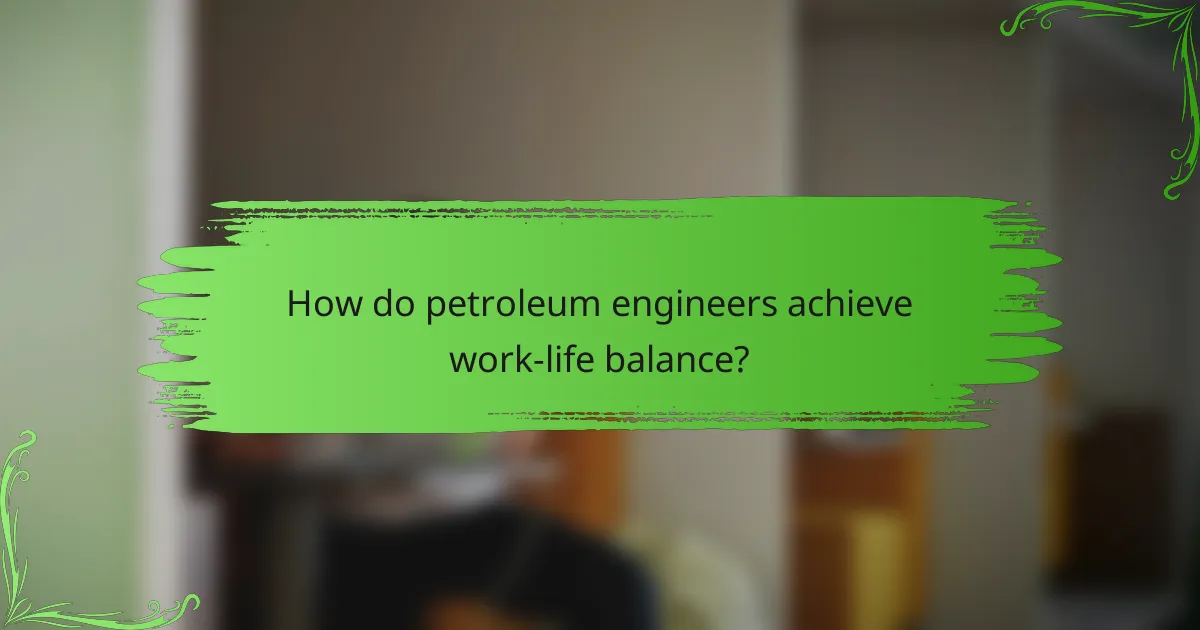
How do petroleum engineers achieve work-life balance?
Pursuing work-life balance is essential for petroleum engineers, who often face demanding schedules and project deadlines. By implementing strategies that prioritize personal time and professional responsibilities, they can maintain a healthier lifestyle and improve job satisfaction.
Setting clear boundaries between work and personal life
Establishing clear boundaries is crucial for petroleum engineers to manage their work-life balance effectively. This can involve setting specific work hours and communicating these to colleagues and supervisors. By doing so, engineers can create a dedicated time for personal activities, reducing the risk of burnout.
Additionally, utilizing tools like calendar apps can help in blocking out personal time and ensuring that work commitments do not encroach on personal life. Regularly reviewing and adjusting these boundaries can also help maintain balance as project demands change.
Flexible work schedules in major oil companies
Many major oil companies offer flexible work schedules to accommodate the needs of petroleum engineers. This flexibility can include options such as remote work, compressed workweeks, or adjustable hours, allowing engineers to tailor their schedules to fit personal commitments.
For instance, some companies may allow engineers to work four 10-hour days instead of the traditional five 8-hour days, providing an extra day off each week. This flexibility can significantly enhance work-life balance, enabling engineers to pursue hobbies, family time, or rest.
Time management techniques for engineers
Effective time management is vital for petroleum engineers to balance their workload and personal life. Techniques such as the Pomodoro Technique, which involves working in focused bursts followed by short breaks, can enhance productivity and reduce fatigue.
Additionally, prioritizing tasks using methods like the Eisenhower Matrix can help engineers focus on what is urgent and important, ensuring that critical projects are completed without sacrificing personal time. Regularly reviewing and adjusting priorities can also keep engineers aligned with both professional and personal goals.

What are the key skills for effective project management in petroleum engineering?
Effective project management in petroleum engineering requires a blend of leadership, technical knowledge, and financial skills. These competencies ensure that projects are completed on time, within budget, and meet safety and environmental standards.
Leadership and team management skills
Leadership is crucial in petroleum engineering projects, as it involves guiding diverse teams toward common goals. Strong leaders foster collaboration, encourage open communication, and resolve conflicts efficiently.
Effective team management also includes understanding team dynamics and individual strengths. Utilizing tools like regular check-ins and performance reviews can help maintain motivation and accountability among team members.
Technical expertise in drilling and production
Technical expertise in drilling and production processes is essential for project managers in petroleum engineering. This knowledge allows managers to make informed decisions, anticipate challenges, and implement solutions effectively.
Staying updated on the latest technologies and methodologies, such as automated drilling systems or enhanced oil recovery techniques, can significantly improve project outcomes. Regular training and industry conferences are good ways to maintain this expertise.
Financial acumen for budgeting
Financial acumen is vital for managing project budgets in petroleum engineering. Project managers must develop accurate cost estimates and monitor expenses to avoid overruns, which can be substantial in this industry.
Understanding key financial metrics, such as return on investment (ROI) and net present value (NPV), helps in making strategic decisions. Utilizing budgeting software can streamline this process, ensuring that financial resources are allocated efficiently throughout the project lifecycle.

What are the prerequisites for becoming a petroleum engineer?
To become a petroleum engineer, individuals typically need a bachelor’s degree in engineering, along with relevant certifications and practical experience. A strong foundation in mathematics, physics, and geology is essential for success in this field.
Educational requirements in engineering
A bachelor’s degree in petroleum engineering or a related engineering discipline is the primary educational requirement for aspiring petroleum engineers. Coursework usually includes subjects like thermodynamics, fluid mechanics, and reservoir engineering.
Some universities also offer specialized programs or concentrations in petroleum engineering, which can provide a competitive edge. Advanced degrees, such as a master’s or Ph.D., may be beneficial for those seeking research roles or academic positions.
Necessary certifications like PE license
Obtaining a Professional Engineer (PE) license is often crucial for petroleum engineers, especially for those who wish to advance in their careers or take on leadership roles. The process typically involves passing the Fundamentals of Engineering (FE) exam, gaining relevant work experience, and then passing the PE exam.
In addition to the PE license, other certifications, such as those offered by the Society of Petroleum Engineers (SPE), can enhance a professional’s credentials. These certifications may focus on specific skills or technologies within the petroleum industry, making candidates more attractive to employers.
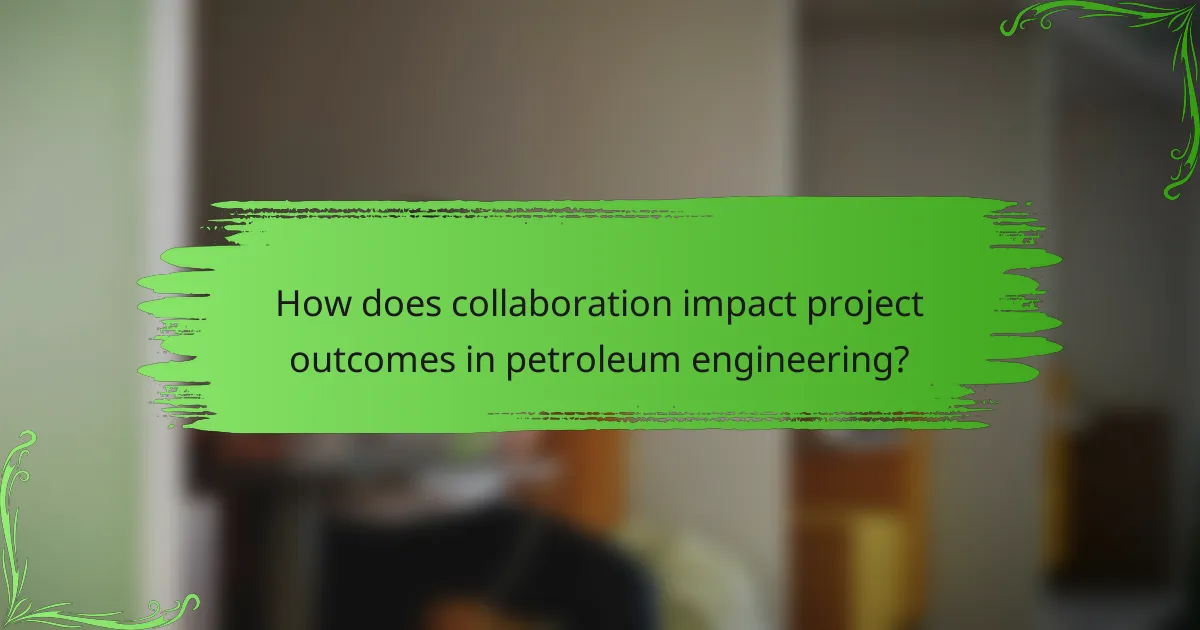
How does collaboration impact project outcomes in petroleum engineering?
Collaboration significantly enhances project outcomes in petroleum engineering by fostering communication, sharing expertise, and aligning goals among team members. Effective teamwork leads to better decision-making and more efficient project execution, ultimately resulting in successful project delivery.
Improved efficiency through teamwork
Teamwork in petroleum engineering streamlines processes by allowing specialists to work together, reducing redundancies and accelerating project timelines. For instance, when geologists and drilling engineers collaborate closely, they can optimize drilling plans, minimizing downtime and resource wastage.
Utilizing collaborative tools and platforms can further enhance efficiency. Teams can share real-time data, project updates, and insights, which helps in making informed decisions quickly. Regular meetings and check-ins can keep everyone aligned and focused on common objectives.
Enhanced problem-solving capabilities
Collaboration enhances problem-solving capabilities by bringing diverse perspectives and expertise to the table. In complex projects, such as offshore drilling, having a multidisciplinary team can help identify potential issues early and devise effective solutions.
Encouraging open communication and brainstorming sessions can lead to innovative approaches to challenges. For example, if a drilling operation encounters unexpected geological formations, a collaborative team can quickly assess the situation and adjust strategies, potentially saving time and costs.
